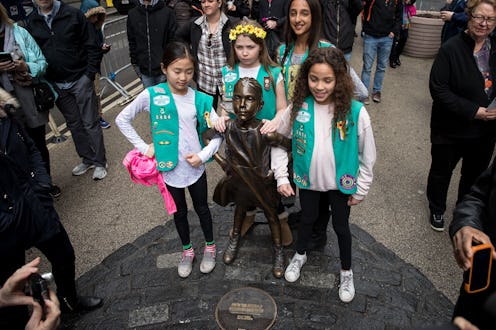News
The Girl Scouts' Guide To Fighting Sexism In America Today

The 2016 election sparked nationwide debates about the different manifestations of sexism in American society and, perhaps even more importantly, how we teach children to respond to it. As the leading group for empowering girls, but also an adamantly nonpartisan one, the Girl Scouts of the USA was in one of the best positions to guide parents on both sides of the aisle on how to talk girls — and boys — in a post-"Nasty Woman" era.
Dr. Andrea Bastiani Archibald, Chief Girl and Parent Expert for the Girl Scouts, tells Bustle that the rhetoric that came out of the 2016 election cycle went beyond what they had previously discussed with their scouts. "We raise and develop girls to be leaders and to look at the world and to listen to the messages that are being sent to both girls and boys," she says. "This, though, this culture of negative talk about girls and women as a whole, goes beyond stereotyping, I think, and has really resonated and had great impact."
As a strictly nonpartisan organization, the Girl Scouts does not take public stances on policy issues. Instead, it focuses on its commitment to growing confident, physically and emotionally healthy girls, Archibald explains.
"We're founded on the belief that we want gender equity and that girls can do anything and everything, that girls and women are valued for what they do [and] how they help the world — not simply for their external appearance," Archibald says. "And a lot of the offensive stuff is really just not seeing girls and women as complex human beings, and just taking them at their external value."
Part of the Girl Scouts curriculum is to provide parents with "the most up-to-date, expert, and actionable guidance on raising girls today," Archibald says. "Too often, we say, 'Oh, this is just adult stuff, don't worry about it,' but kids can sense when their parents or adults around them are upset by something. And then, when they [kids] are shut down from talking about it, it's not always that helpful. In fact, it can encourage more concern, anxiety and fear."
A girl who's eight or nine might say, 'This is confusing. I'm told I'm smart, I'm powerful, I'm beautiful, but then I hear this.' We always look to parents and caregiver as role models and we want them to lead by example.
And it's not just girls who are affected by these comments. Archibald brings up that it is critical to include boys in these lessons. They "don't want someone seeing this [sexist language and behavior] and thinking all boys are that way," Archibald says. "It shares a distorted, limited and offensive notion of what it means to be a man."
Archibald says that parents need to be aware of the way they themselves speak about women and girls -- even the subtle, nonverbal messages their actions may be sending young kids about girls and women and their value.
"I think often parents can be incredibly empowering and supportive with their own girls, but are they talking about other women, perhaps in earshot of their daughter, in disparaging ways? Are they focusing on their looks or critiquing the bodies of celebrities?" Archibald says. "A girl who's eight or nine might say, 'This is confusing. I'm told I'm smart, I'm powerful, I'm beautiful, but then I hear this.' We always look to parents and caregiver as role models and we want them to lead by example."
Archibald also says it is helpful for girls to have a script ready for when they encounter sexist talk or behavior outside the home. Parents should work with their kids to imagine potential scenarios, come up with responses and then practice strong responses.
"Girls will often feel like they have to either pretend they didn't hear it, or be really polite,"Archibald says. "But it's OK to stand up for yourself and have boundaries and say 'That offends me. That hurts me. You really don't believe that, do you?'"
For more information about Girl Scouts and how to join or volunteer, visit www.girlscouts.org